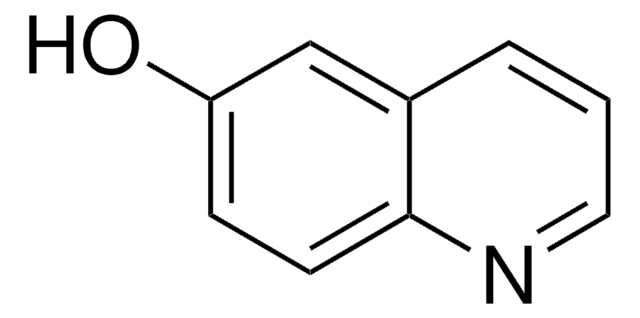252565
8-Hydroxyquinoline
ACS reagent, 98.5%
Synonym(s):
8-Quinolinol, 8-Hydroxyquinoline, 8-Oxychinolin, Oxine
About This Item
Recommended Products
grade
ACS reagent
Quality Level
Assay
98.5%
ign. residue
≤0.05%
mp
72.5-74.0 °C
anion traces
sulfate (SO42-): ≤0.02%
antibiotic activity spectrum
fungi
Mode of action
DNA synthesis | interferes
enzyme | inhibits
SMILES string
Oc1cccc2cccnc12
InChI
1S/C9H7NO/c11-8-5-1-3-7-4-2-6-10-9(7)8/h1-6,11H
InChI key
MCJGNVYPOGVAJF-UHFFFAOYSA-N
Looking for similar products? Visit Product Comparison Guide
General description
Application
Signal Word
Danger
Hazard Statements
Precautionary Statements
Hazard Classifications
Acute Tox. 3 Oral - Aquatic Acute 1 - Aquatic Chronic 1 - Eye Dam. 1 - Repr. 1B - Skin Sens. 1
Storage Class Code
6.1C - Combustible acute toxic Cat.3 / toxic compounds or compounds which causing chronic effects
WGK
WGK 3
Flash Point(F)
Not applicable
Flash Point(C)
Not applicable
Personal Protective Equipment
Choose from one of the most recent versions:
Certificates of Analysis (COA)
Don't see the Right Version?
If you require a particular version, you can look up a specific certificate by the Lot or Batch number.
Already Own This Product?
Find documentation for the products that you have recently purchased in the Document Library.
Customers Also Viewed
Our team of scientists has experience in all areas of research including Life Science, Material Science, Chemical Synthesis, Chromatography, Analytical and many others.
Contact Technical Service














